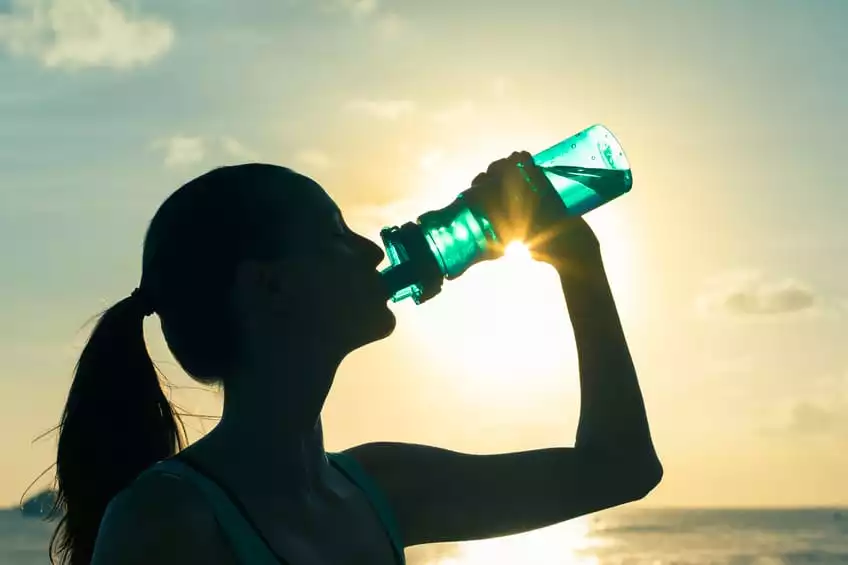
Looking forward to relaxing in the summer sun? Soaking up a bit of sunshine can boost Vitamin D levels and even improve your mood. Feel free to get out there and be active — just be sure to stay healthy and safe while you do it. Remember: “too much of a good thing” still applies, so it’s important to enact good self-care while you’re out on sunny day adventures.
These 5 tips will help you stay healthy in the summer the heat to maximize your warm-weather fun without harm.
1. Stay Hydrated
The best way for you to stay healthy this summer is by staying hydrated. Proper hydration can prevent the following problems:
- sun stroke
- heat exhaustion
- nausea
- headaches
- dizziness
In addition to preventing common problems caused by too much summer heat, staying hydrated can also allow your body to maintain proper energy levels.
When temperatures are high (especially between 12 p.m. and 4 p.m.), adjust your water intake based on your activity. Aim for approximately 1 to 2 liters of water every 12 hours if you’re particularly active. Watch your thirst closely; if you’re thirsty faster, drink a bit more water. If you’re urinating frequently and it’s essentially clear, you may be drinking more than you need.
Address critical signs of dehydration immediately. When in doubt, always seek medical care — advanced heat stroke and exhaustion can be fatal if left untreated.
2. Add Electrolytes
Drinking water alone isn’t enough to stay healthy during the summer heat; in fact, it can be directly harmful to your health. Your body requires electrolytes, like salt and potassium, for proper hydration, and subsisting off of just water can flush those out rather than restocking them.
Diluted electrolytes (sometimes referred to as hyponatremia) can result in conditions like:
- nausea
- dizziness
- hypokalemia
- cardiac edema
- convulsions
- death, if prolonged extensively
To prevent these conditions, make sure you eat small, frequent meals throughout the day.
Though sports drinks and salty snacks aren’t always healthy, they can keep your electrolytes balanced when you’re playing sports in the sun. Avoid drinks like Gatorade and Powerade in favor of Gastrolyte and home-made rehydration mixes. They contain less of what you don’t need and more of what you do!
3. Apply Sunscreen
Headed out into the sunshine for the day? Make sure to apply sunscreen when you go. Applying sunscreen is one of the most important ways to protect your skin when the sun is high in the sky, but only if you apply it correctly in the first place.
Use a formula with as high an SPF as possible — 60 SPF is a good starting point. For kids, babies, and people with sensitive skin, pick a formula created specifically for these issues. If you’re not sure which formula is best, ask your pharmacist to verify.
Don’t forget to reapply your sunscreen frequently. If sunbathing, sweat will degrade it over the course of an hour or two at most. If swimming, degradation occurs at an even faster rate.
Think waterproof sunscreen is foolproof? Think again. You should still reapply it regularly throughout the day, especially on sensitive areas like the face, shoulders, chest, and upper back.
4. Treat Insect Bites and Stings Safely
Insect bites and stings often bring patients into the doctor’s office or pharmacy. They itch, they hurt, they swell — they’re just really uncomfortable, no matter if you’re bit by a mosquito or stung by a wasp.
Higher temperatures bring insects out in droves, especially if you live near a body of water or have a garden nearby. Knowing how to deter them or treat bites and stings will significantly reduce complications and associated risks.
Everyday Bugs
For everyday bugs like mosquitos, black flies, gnats, horseflies, and deer flies, first rinse the bite off with warm water. If itching or swelling occurs, most patients can use a Benadryl stick to gently dab the bite or sting zone.
Stinging Insects
For bees, wasps, hornets, and other stinging insects, remove the stinger (if still in place) gently by scraping a credit card towards and then away from the entry point. Don’t attempt to remove the stinger with tweezers; this can release more venom. Then, wash the sting and apply a cold compress for 10 to 15 minutes.
If swelling occurs, oral Benadryl and other allergy medications may help. Take the patient to the emergency room for immediate care if they experience breathing difficulties, dizziness, extreme swelling, or swelling around the face, throat, and eyes. If it’s you that’s experiencing the symptoms, and you’re alone, call 911 and stay on the line until they arrive.
Ticks
The recent tick explosion in many areas of the United States means that patients should also watch closely for tick bites after spending time outside. Investigate children, pets, and adults carefully each time they come into the house. An embedded tick is most likely to bury itself along the groin, the back of the neck, and in the hair, so be sure to check there, too.
If you do spot an embedded tick, use a pair of specialized tick tweezers to remove it. Wash the area and watch it carefully for the first seven days — a target-like rash or swelling could point to Lyme disease or other tick-borne illnesses.
5. Prevent Food Poisoning
Nothing will ruin your family reunion faster than food poisoning.
Surprisingly, this is one summer heat safety tip Americans often overlook. As we’re spending time outdoors, we have a tendency to assume as long as it’s in the cooler or not left out too long, it’s okay. That’s not true.
Tainted food at barbecues and picnics can make you seriously sick — think salmonella, e. Coli, giardia, norovirus, campylobacter and even listeria.
Some of these germs are inherent in certain foods, like salmonella, while others are spread from person-to-person as they handle the food.
Either way, increased summer humidity and temperatures increase the rate of bacteria growth — meaning you have a higher risk of getting sick in the summer. That cooler full of snacks could very well make you sick if you’re not careful. Here are a few tips on how to lower your risk for foodbourne pathogens and stay healthy during the summer months.
- Cook food well
- Keep hot foods hot (about 60 degrees Celsius) and cold foods cold (under 4 degrees Celsius)
- Avoid leaving foods sitting out in the sun, especially if they contain dairy products, meat, or eggs
- Serve meals and then clean up within an hour
- If you wish to provide snacks, stick to items like chips, crackers, cheese, and other relatively hardy items that don’t degrade quickly
Having a large gathering outside? Keep your hot foods hot with a buffet warmer and ensure that coolers contain ice at all times. Avoid foods that contain homemade mayonnaise, raw eggs (e.g. royal icing), raw fish, and rare meats (unless cooked on the spot).
The most important way to stay healthy this summer is to take care of yourself. As the sun goes down each summer day, take time to engage in basic self-care and relaxation. Stay hydrated, eat regularly, and — perhaps most importantly — know when it’s time to come out of the sun and get some rest.

 info@burtsrx.com
info@burtsrx.com
